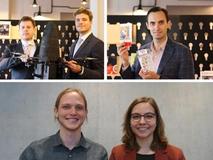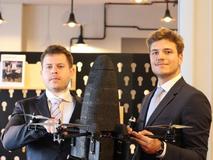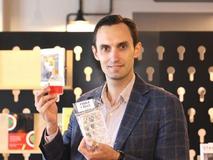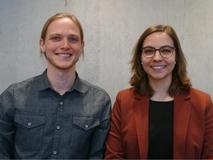CHF 40,000 for state-of-the-art inspection drones, optical sensors for bioprocess monitoring, and the next generation heating of textiles
09.02.2023
Elythor, MaraCells, qCella win Venture Kick's second stage of financial and entrepreneurial support. Their projects focus on developing solutions for inspecting and monitoring linear infrastructure, helping users reduce the time it takes to monitor and analyze cell cultures, and developing heating pads for the next-generation heating of textiles.
 |
 Elythor's founder Charalampos (Harry) Vourtsis and co-founder Nathan Samuel Muller
|
 Maracells' Dr. Vitalijs Zubkovs
|
 qCella's Fabian Schmid and Murielle Schreck
|
Elythor: State-of-the-art inspection drones
Drones for linear infrastructure inspection and monitoring are required to fly in the targeted construct's proximity at low speeds while withstanding adverse weather conditions such as high wind currents or gusts. At the same time, they must retain their ability to fly for long ranges to cover the entire length of the infrastructure without frequent recharging so that they do not compromise critical time missions and increase operational costs. Current drones on the market fail to satisfy these requirements.
Elythor is a spin-off from the EPFL's Laboratory of Intelligent Systems and focuses on developing solutions for inspecting and monitoring linear infrastructure. Elythor was founded by Charalampos (Harry) Vourtsis, Ph.D. in Aerial Robotics at EPFL and EPFLinnovators fellow, and co-founded by Nathan Samuel Muller, M.Sc. in Robotics at EPFL, and Dario Floreano, Professor at EPFL. They are developing a morphing drone that can fly in centimeter proximity to linear infrastructure due to its protective configuration while retaining its ability to fly for long distances to monitor and inspect the entirety of the infrastructure without compromising efficiency and battery power even in adverse weather conditions.
Better efficiency and decreased power consumption mean less interruption of the operation for charging cycles. This translates into faster operations and reduces human intervention in drone deployment. Currently, the target market is the inspection and monitoring industry. The inspection and maintenance world market in 2021 was summed to CHF 42.66 billion and is expected to grow to CHF 72.46 billion in 2029. The infrastructure inspection and maintenance world market is projected to demonstrate a substantial growth rate from CHF 2.09 billion in 2021 to CHF 3.78 billion in 2029.
The Venture Kick funding will allow them to reach critical milestones within the next year that will enable their project to grow further. The grant will be used first for the business plan refinement and market study. elythor.com
Maracells: Optical sensors for bioprocess monitoring and automation
Until now, there was no solution for continuous glucose monitoring in small cell culture volumes. Glucose is the main nutrient for most cultures used in the production of biopharmaceuticals.
Maracells develops a technology to address the need for glucose monitoring. The sensor can be integrated into various form factor culture flasks which are already used by R&D laboratories in the industry. Continuous monitoring allows for accelerating cell culture clone development and media optimization processes. Moreover, the sensor can be integrated with automatic cell culture feed systems digitalizing and automating biopharmaceutical discovery. Maracells is also exploring cooperation with established bioreactor manufacturers in order to integrate the technology.
Maracells has an interdisciplinary co-founders team that includes Dr. Sebastian Hersberger (CEO), Dr. Vitalijs Zubkovs (CSO), and Miha Markocic (CTO). Miha and Vitalijs work at CSEM and perform biotech, optics, electronics, and software development for technology demonstration and validation. Sebastian is a seasoned entrepreneur in the biotech industry and is in charge of business strategy and finance for Maracells. The Maracells team member Antoine Dujardin focuses on market research and product requirement validation with future customers and got involved in the spin-off during his eMBA at EPFL. The team aims to spin off from CSEM in the upcoming year.
The Venture Kick funds will go towards financing marketing and partnering activities, conference fees, fundraising efforts, and legal and IP consultation. www.maracells.com
qCella: next-generation heating of textiles
Heated clothing, heated pain relievers, heated car seats, and car interiors, all these products contain metal or carbon wires that serve as heating elements, in which the electrical energy of a power source, often a battery, is converted into heat.
At qCella, natural fibers like cellulose are impregnated with copper to create a unique patent-pending hybrid material, which is used to develop heating mats with superior properties compared to commercially available heating wires. The qCella heating mats have the proper electrical resistance across the entire structure so that they heat homogeneously when connected to a power source (e.g., a battery). Because of this, they can be cut into any shape and size, they are paper-thin, light, and flexible, and can be easily and cost-effectively integrated into the final products of heated product manufacturers. The total addressable market for this heating element is estimated to be at least CHF 6.5 billion.
qCella emerged from the doctoral thesis of Dr. Murielle Schreck at ETH Zürich. She invented the technology and is the co-owner of the patent application. Together with Fabian Schmid, they have further developed the technology toward market readiness. Both have a background in materials science.
The Venture Kick financing will enable them to further increase their traction level by meeting the demand for samples, asked for by many interested parties and pilot customers, which will help them to accelerate a successful market entry. qcella.com
Drones for linear infrastructure inspection and monitoring are required to fly in the targeted construct's proximity at low speeds while withstanding adverse weather conditions such as high wind currents or gusts. At the same time, they must retain their ability to fly for long ranges to cover the entire length of the infrastructure without frequent recharging so that they do not compromise critical time missions and increase operational costs. Current drones on the market fail to satisfy these requirements.
Elythor is a spin-off from the EPFL's Laboratory of Intelligent Systems and focuses on developing solutions for inspecting and monitoring linear infrastructure. Elythor was founded by Charalampos (Harry) Vourtsis, Ph.D. in Aerial Robotics at EPFL and EPFLinnovators fellow, and co-founded by Nathan Samuel Muller, M.Sc. in Robotics at EPFL, and Dario Floreano, Professor at EPFL. They are developing a morphing drone that can fly in centimeter proximity to linear infrastructure due to its protective configuration while retaining its ability to fly for long distances to monitor and inspect the entirety of the infrastructure without compromising efficiency and battery power even in adverse weather conditions.
Better efficiency and decreased power consumption mean less interruption of the operation for charging cycles. This translates into faster operations and reduces human intervention in drone deployment. Currently, the target market is the inspection and monitoring industry. The inspection and maintenance world market in 2021 was summed to CHF 42.66 billion and is expected to grow to CHF 72.46 billion in 2029. The infrastructure inspection and maintenance world market is projected to demonstrate a substantial growth rate from CHF 2.09 billion in 2021 to CHF 3.78 billion in 2029.
The Venture Kick funding will allow them to reach critical milestones within the next year that will enable their project to grow further. The grant will be used first for the business plan refinement and market study. elythor.com
Maracells: Optical sensors for bioprocess monitoring and automation
Until now, there was no solution for continuous glucose monitoring in small cell culture volumes. Glucose is the main nutrient for most cultures used in the production of biopharmaceuticals.
Maracells develops a technology to address the need for glucose monitoring. The sensor can be integrated into various form factor culture flasks which are already used by R&D laboratories in the industry. Continuous monitoring allows for accelerating cell culture clone development and media optimization processes. Moreover, the sensor can be integrated with automatic cell culture feed systems digitalizing and automating biopharmaceutical discovery. Maracells is also exploring cooperation with established bioreactor manufacturers in order to integrate the technology.
Maracells has an interdisciplinary co-founders team that includes Dr. Sebastian Hersberger (CEO), Dr. Vitalijs Zubkovs (CSO), and Miha Markocic (CTO). Miha and Vitalijs work at CSEM and perform biotech, optics, electronics, and software development for technology demonstration and validation. Sebastian is a seasoned entrepreneur in the biotech industry and is in charge of business strategy and finance for Maracells. The Maracells team member Antoine Dujardin focuses on market research and product requirement validation with future customers and got involved in the spin-off during his eMBA at EPFL. The team aims to spin off from CSEM in the upcoming year.
The Venture Kick funds will go towards financing marketing and partnering activities, conference fees, fundraising efforts, and legal and IP consultation. www.maracells.com
qCella: next-generation heating of textiles
Heated clothing, heated pain relievers, heated car seats, and car interiors, all these products contain metal or carbon wires that serve as heating elements, in which the electrical energy of a power source, often a battery, is converted into heat.
At qCella, natural fibers like cellulose are impregnated with copper to create a unique patent-pending hybrid material, which is used to develop heating mats with superior properties compared to commercially available heating wires. The qCella heating mats have the proper electrical resistance across the entire structure so that they heat homogeneously when connected to a power source (e.g., a battery). Because of this, they can be cut into any shape and size, they are paper-thin, light, and flexible, and can be easily and cost-effectively integrated into the final products of heated product manufacturers. The total addressable market for this heating element is estimated to be at least CHF 6.5 billion.
qCella emerged from the doctoral thesis of Dr. Murielle Schreck at ETH Zürich. She invented the technology and is the co-owner of the patent application. Together with Fabian Schmid, they have further developed the technology toward market readiness. Both have a background in materials science.
The Venture Kick financing will enable them to further increase their traction level by meeting the demand for samples, asked for by many interested parties and pilot customers, which will help them to accelerate a successful market entry. qcella.com


